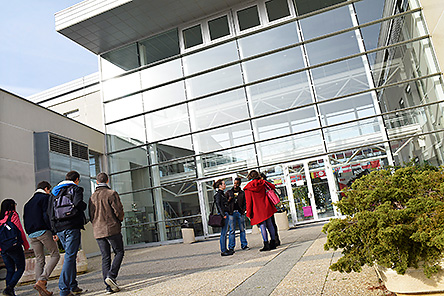Bourges campus
On the Bourges campus two engineering courses are available to students with the Industrial Risk Control (MRI) and Information Technology and Cybersecurity (STI) departments, and one apprenticeship-training course, Energy Risks and the Environment (ERE), is taught together with the Cher Chamber of Commerce and Industry (CCI) Hubert Curien CFSA (Apprentice Further Training Centre) in Bourges.

Entrance to the Bourges campus
© INSA CVL
Engineering courses available to students
Industrial risk control (MRI department
General course tailored to a systemic industrial risk approach.
Industrial Risk Control Engineers are trained in the various aspects associated with managing the risks inherent in a company and its business:
- preventive action,
- corrective action,
- safety of people and property,
- environmental impacts,
- corporate responsibilities,
- major and external risks.
The course comprises :
- a 3rd year following the core syllabus
- a 4th year following the core syllabus plus advanced modules (30%) including:
- Mechanical and Energy Engineering
- Process engineering
- Advanced systems
A four-month placement in a company is undertaken in the second semester - a 5th year following the core syllabus plus elective modules (56%) including:
- Industrial Accidents and Risks
- Nuclear Energy
- Environmental Risks
- Industrial Systems and Risks
- Transport, Production, Robotics
A six-month end-of-course placement in a company is undertaken in the second semester
Information technology and cybersecurity (STI) department
Specialist course in information technology, with a strong focus on security.
Information Technology and Cybersecurity engineers at the INSA Centre Val de Loire specialise in information technology and are in charge of the development and particularly the security of new information systems.
The course comprises:
- a 3rd year following the core syllabus
- a 4th year following the core syllabus plus advanced modules (around 15%) including:
- e-commerce
- Big Data
- Mobility
A four-month placement in a company is undertaken in the second semester - a 5th year following the core syllabus plus elective modules (around 60%) including:
- Arquitecture Administration Audit and Security Analisis
- Software Security and Architecture
- Ubiquitous Computing Security
A six-month end-of-course placement in a company is undertaken in the second semester
Apprenticeship engineering courses
Energy, risks and the environment (ERE) department
Depending on the options they choose, engineering graduates work in the following areas:
- Prevention engineering associated with technological risks, protection of people, infrastructure and property in a company and damage compensation;
- Quality engineering, which encompasses sustainable development approaches;
- Energy efficiency in the field of building renovation.
The professions this course prepares apprentices for involve three types of activity:
- Developing corporate strategy in terms of energy efficiency, quality and risk governance;
- Engineering of energy, quality and risk management systems;
- Change management in risk, quality and energy efficiency approaches
These three types of activity:
- Developing corporate strategy in terms of risk governance, quality and energetic efficiency ;
- Engineering of systèmes management in risk, quality and energy ;
- Steering change management approaches in risk, quality and energetic efficiency.
These three activity groups:
- Structure the skill set listed in the course's competency framework;
- Are economically and socially approved;
- Factor in the concerns for protection of people and the environment.
This is a work-linked training course lasting 3 years, with 1/3 of the time given over to teaching and 2/3 to work in a company.
The modules (accounting for about 1800 hours of classes in total) are made up each year of the core syllabus plus elective modules, including:
- Risk Governance and Engineering
- Quality Engineering
- Energy Efficiency Management

